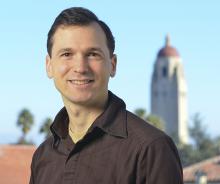Past Seminars
The HCII Seminar Series has been a weekly tradition at CMU since 1990. Details of our seminars from 2014 to present, as well as many of their recordings, are available below. A few years ago, we held a year of special programming in celebration of the seminar's 25th anniversary.
| Date | Title | Speaker | Talk title and Abstract |
|---|---|---|---|
| Interaction Design and Imaginaries: Beyond Behavior Change |
Dan Lockton Assistant Professor & Chair of Design Studies, Carnegie Mellon University School of Design |
How we think about the world affects what we do. The imaginaries we have—the stories we tell ourselves and each other, the mental models, language, framings and metaphors we use, the associations and mental imagery that come to mind when we think about concepts—make a difference to the way we… Full Details |
|
| Can We Design Machines to Be More Humane? |
Paul Pangaro Chair and Associate Professor, MFA Interaction Design, College for Creative Studies |
Billions of people use digital machines every day and we are all subject to their qualities. Who would question a quality that allows a digital network to transform text into a connection to everyone we love? Or to transform keywords into a vast volume of rich content?
|
|
| Deep Learning for Understanding Driver Behavior in 275,000 Miles of Semi-Autonomous Driving Data |
Lex Fridman Research Scientist, Massachusetts Institute of Technology |
Today, and possibly for a long time to come, the full driving task is too complex an activity to be fully formalized as a sensing-acting robotics system that can be explicitly solved through model-based and learning-based approaches in order to achieve full unconstrained vehicle autonomy.… Full Details |
|
| If the Shoe Fits: Towards A Conceptual Model for Applied Deep Learning in Social Computing |
Carolyn P Rose Professor, Human-Computer Interaction Institute, Carnegie Mellon University |
For more than a decade, a growing interest in automated processing of behavior traces has been in evidence across areas in HCI, perhaps especially in Social Computing. Each new wave in computational modeling paradigms raises hopes of new possibilities, most recently Deep Learning. This… Full Details |
|
| Supporting People with Low Vision with Augmented Reality |
Shiri Azenkot Assistant Professor, Cornell Tech, Cornell University |
||
| Computational Ecosystems: Tech-enabled Communities to Advance Human Values at Scale |
Haoqi Zhang Allen K. and Johnnie Cordell Breed Junior Chair of Design, Assistant Professor in Computer Science, Northwestern University |
Despite the continued development of individual technologies and processes for supporting human endeavors, major leaps in solving complex human problems will require advances in system-level thinking and orchestration. In this talk, I describe efforts to design, build, and study … Full Details |
|
| How to Design with Openness: Shaping a Design Approach for Open and Growing Systems |
Joep Frens Assistant Professor, Department of Industrial Design, Eindhoven University of Technology |
In this lecture I argue that (interaction) design is changing from a “one product – one user” perspective towards a more “multiple products – multiple users” perspective, a systems perspective. I posit that this systems perspective brings new challenges to design, like ‘growth’ and ‘openness’,… Full Details |
|
| Special HCII Seminar: Soft Materials for Human Compatible Machines and Electronics |
Carmel Majidi Associate Professor, Mechanical Engineering, Carnegie Mellon University |
Professor Carmel Majidi directs the Integrated Soft Materials Lab at CMU, Mechanical Engineering department. Currently, his group is focused on filled-elastomer composites and soft microfluidic systems that exhibit unique combinations of mechanical, electrical, and… Full Details |
|
| Design at the Interface |
Daniel Cardoso Llach Assistant Professor, School of Architecture, Carnegie Mellon University |
At the dawn of the information age Herbert Simon advanced a view of design as a ‘science of the artificial’ that could be expressed by statements of declarative logic, and thus formalized as a scientific, measurable practice. While Simon’s bold claim manifested larger techno-cultural changes, it… Full Details |
|
| Prototyping a More Positive Future |
Sophia Brueckner Assistant Professor, Stamps School of Art & Design, University of Michigan |
Sophia Brueckner is a futurist artist, designer, and engineer. Inseparable from computers since the age of two, she believes she is a cyborg. At Google, she designed and implemented products used by tens of millions. At RISD and the MIT Media Lab, she combined the… Full Details |
|
| User Research: The Designer’s Ticket to Informing Strategy |
Jeremy Koempel Co-Founder and Design Lead, Bessemer Alliance |
The rate of change in our world is breathtaking. Many organizations simply cannot evolve quick enough to capitalize on this change and prepare for the future. Left to their own devices, they will continue to address their markets and customers with the traditional processes and tactics with… Full Details |
|
| Practical Learning Research at Scale (and Relevance to HCI Education) |
Ken Koedinger Professor, Human-Computer Interaction Institute, Carnegie Mellon University |
Massive scale education has emerged through online tools such as Wikipedia, Khan Academy, and MOOCs. The number of students being reached is high, but what about the quality of the educational experience? As we scale learning, we need to scale research to address this question. Such… Full Details |
|
| HCII Seminar Series: Post-Doc Talks |
Paulo Carvalho, Irene-Angelica Chounta, Patrick Carrington, Sang-Won Bae Post-Doctoral Researchers, Human-Computer Interaction Institute, Carnegie Mellon University |
Speaker 1: Paulo Carvalho Talk Title: Beyond reading in educational contexts: Spending more time on practice activities as a better way to learn. Abstract: Learning by doing refers to learning… Full Details |
|
| Morphing Matter: Designing Bioinspired Transformative Materials and Interfaces |
Lining Yao Assistant Professor, Human-Computer Interaction Institute, Carnegie Mellon University |
Technology, one might claim, is designed to recapitulate biology: as we strive to design physical objects and architecture that are adaptive, responsive and ever evolving, we find ourselves immersed in Nature’s way. Yet, after years of practice… Full Details |
|
| Tracking Behavioral Symptoms of Mental Health and Delivering Personalized Interventions Using Mobile and Wearable Devices |
Tanzeem Choudhury Associate Professor, Computing and Information Systems, Cornell University |
Mobile and ubiquitous computing research has led to new techniques for cheaply, accurately, and continuously collecting data on human behavior that include detailed measurements of physical activities, social interactions and conversations, sleep quality and… Full Details |
|
| All the World's a Stage: Mobile Computing Across Multiple Contexts to Support Science On-The-Go |
Chris Quintana Associate Professor in Educational Studies, School of Education, University of Michigan |
As computing devices continue to evolve from personal computers to mobile and wearable technologies, new learning opportunities are opening up. Specifically, we have been interested in supporting science learning, and considering how a range of these technologies can be designed in a supportive… Full Details |
|
| Deception and Trust in a Post-Truth World |
Jeff Hancock Professor, Institute for Research in the Social Sciences, Stanford University |
How is the rewiring of communication in the network age changing how we deceive and trust one another? How can we trust that news story, or a hotel’s online review, or that text message about someone being on their way? In this talk we’ll go over how principles from psychology and communication… Full Details |
|
| TALK CANCELED: How Games Move Us: Emotion by Design |
Katherine Isbister Professor, Computational Media Department, University of California Santa Cruz |
Designers know games can evoke empathy and intense connection. But everyday non-expert conversations about games still rarely touch on this truth. In this talk, Isbister shares insights from her recent book aimed at bridging this gap, toward raising the quality of discourse about games as an… Full Details |
|
| The Challenges and Opportunities for Real-time Ridesharing Services to Address Unemployment Barriers Among Low-Resourced Populations |
Tawanna Dillahunt Assistant Professor, School of Information, University of Michigan |
Improved transportation is a key predictor for upward economic mobility, and the relationship between transportation and economic mobility is stronger than that between economic mobility and factors like crime, the percentage of two-parent families, and elementary-school test scores. Real-… Full Details |
|
| Innovators and their Others: Entrepreneurial Citizenship in Transnational India |
Lilly Irani Assistant Professor of Communication & Science Studies, University of California San Diego |
This talk focuses on how valorized forms of work become models of citizenship. Today, the halls of TED and Davos reverberate with optimism that hacking, brainstorming, and crowdsourcing can transform citizenship, development, and education alike. I will examine … Full Details |
|
| CANCELED: Tracking Behavioral Symptoms of Mental Health and Delivering Personalized Interventions Using Mobile and Wearable Devices |
Tanzeem Choudhury Associate Professor, Computing and Information Sciences, Cornell University |
CANCELED: Mobile and ubiquitous computing research has led to new techniques for cheaply, accurately, and continuously collecting data on human behavior that include detailed measurements of physical activities, social interactions and conversations, sleep quality and duration and more.… Full Details |
|
| Predictive Interaction |
Jeffrey Heer Associate Professor, Computer Science & Engineering, University of Washington |
How might we architect interactive systems that have better models of the tasks we're trying to perform, learn over time, help refine ambiguous user intents, and scale to large or repetitive workloads? In this talk I will present Predictive Interaction, a framework for interactive systems that… Full Details |
|
| Asking Technology: A Step Too Far or Not Far Enough? |
Yvonne Rogers Director, UCL Interaction Centre, University College London |
Much of HCI research involves asking people questions, either through interviews, surveys, design sessions, evaluation studies, voting, polling and so on. We choose our methods depending on what we want to find out. However, there is also increasing evidence showing how the use of different… Full Details |
|
| Achieving Real Virtuality: Closing the Gap Between the Digital and the Physical |
Daniel Wigdor |
As digital interaction spreads to an increasing number of devices, direct physical manipulation has become the dominant metaphor in HCI. The promise made by this approach is that digital content will look, feel, and respond like content from the real world. Current commercial systems fail to… Full Details |
|
| In A Flash: Crowdsourcing Organizations, Collaborations, and Research |
Michael Bernstein Assistant Professor of Computer Science, Stanford University |
Crowdsourcing envisions computational systems that enable complex collective achievements. However, today's crowdsourcing techniques are limited to goals so simple and modular that their path can be entirely pre-defined. In this talk, I describe crowdsourcing techniques that enable far more… Full Details |
|
| Participatory Design as a Practice in the Learning Sciences |
Betsy N. Disalvo Assistant Professor, School of Interactive Computing, Georgia Tech |
The goal of the learning sciences is to not only understand the phenomena of learning, but also to impact educational practices and enable more effective learning. To meet these goals, learning scientists use iterative and design methods as they design curriculum… Full Details |
|
| Aesthetics of Intelligence: Designing User Experience for Systems of Smart Things |
Lin-Lin Chen Professor, Industrial and Commercial Design, National Taiwan University of Science and Technology |
The vision of a smart environment, where invisible technologies seamlessly support people’s daily activities, is closer to becoming reality. After decades of research, smart things have become commonly available and are being adopted into people’s homes. Despite of the commercial… Full Details |
|
| Instrumented and Connected: Designing Next-Generation Learning Experiences |
Tovi Grossman |
The history of computing is rich with examples of how computers, among their many purposes, serve as tools which enhance our ability to learn. As these computing technologies advance, so too do the ways in which we learn. |
|
| Unlocking Data, Unlocking Interaction |
James Fogarty Associate Professor, Computer Science & Engineering, University of Washington |
The applications we create are framed by the tools we use to create them. On one hand, tools codify effective practice and empower design. On the other, that same codification eventually constrains design. My research examines new approaches to interactive systems in light of this tradeoff,… Full Details |
|
| From Typing Without Looking to Communicating With the Eyes |
Khai N Truong Associate Professor, Computer Science Department, University of Toronto |
Text entry is an important form of input regularly performed by computer users. However, there are many situations in which users might not be able to enter text using a physical QWERTY keyboard. One aspect of my research over the past 5 years has focused specifically on how to enable… Full Details |






